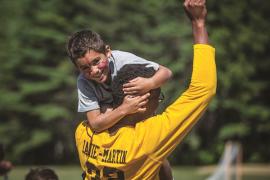Camp provides a welcoming space where youth can unplug, creating a natural environment for reflection. Camp staff ask kids inquisitive questions, helping youth find their voice and develop their point of view. Self-discovery, personal growth, independence, and self-reliance are all explored through intentional programming where every voice, as well as failing forward, is celebrated. This dynamic combination of unique space, supportive environment, and caring adults often provides campers a platform to share their thoughts on the world, how they are feeling, and reflections. Campers unpack past experiences, their relationships, news headlines, and the world around them. They explore their faith, beliefs, values, and the core of who they are.
And within this incredible youth development, you are charged with helping kids navigate through challenging topics, conflicting beliefs, traumatic experiences, and various emotions. Camps create time for reflection through activities like journaling, vespers, and campfire chats. The quiet and peace found in nature, the unplugged space, the feeling of awe, the camaraderie of cabinmates, and the listening ears of caring adults make camp a natural place for campers to reflect on difficult news headlines, deeply impactful life experiences, and developmental milestones. And with this comes a responsibility for you, the caring adults at camp, to support campers as they unpack these big feelings.
Reflecting on the challenges and triumphs of simply growing up brings to mind one of television host Fred Rogers’ (better known as Mister Rogers) greatest quotes: “When I was a boy and I would see scary things in the news, my mother would say to me, ‘Look for the helpers. You will always find people helping’” (Rogers & Head, 1983). This quote serves as a reminder that amidst chaos, there are always individuals who rise to the occasion to offer support, comfort, and assistance. And at camp, that is the role of the camp counselor.
You are on the front lines, guiding children through navigating their feelings, fears, and questions about the world around them. This can be a daunting task, one that requires immense empathy, patience, and resilience. Sensitively supporting youth requires intentionality and thoughtful communication.
This guide offers practical tools and techniques to create a safe and supportive environment, foster open communication, and provide age-appropriate explanations and reassurance. It also highlights the importance of your own well-being — because supporting others starts with taking care of yourself.
- Take care of yourself: Taking care of yourself is vital to your ability to be present and attentive. Effective ways to do this include using your time off thoughtfully to rest and rejuvenate, building a support system outside of camp, and continuing self-care strategies you use at home while at camp. If you are struggling, let a supervisor know.
- Stay calm: Youth will look to you for cues on how to react. Remaining calm is reassuring. It’s OK to take a moment to think before responding — let campers know their questions are important and that you want to take a little time to reflect on what they’ve shared. If you’re feeling overwhelmed or emotional, start by taking a deep breath. Ask for support — whether it’s from a coworker, a supervisor, or a trusted friend. You don’t have to navigate tough moments alone.
- Be honest and age-appropriate: Share information that is truthful, factual, and suitable for the camper’s age and understanding. Let kids know you can keep things private, but you can’t promise confidentiality. Private means you will respect their feelings, autonomy, and privacy. However, you can’t keep things confidential if they share something that involves harm to themselves or others, abuse, or a safety concern. Build trust by being transparent while being honest about your responsibility as the caregiver.
- Actively listen: Give your full attention while campers express their feelings and thoughts. Be patient and listen without interrupting. Also, be thoughtful about using nonverbal cues like nodding to show you are listening. When they finish talking, validate their feelings with phrases like, “That sounds challenging,” or “I can see why you would feel that way.”
- Offer reassurance: Comfort kids by ensuring their safety and care. You can do this by normalizing emotions, letting them know it’s OK to feel upset. You can say things like, “It’s OK to feel that way,” or “We all have big feelings sometimes, and that’s normal.”
- Keep a routine: Maintain a regular camp schedule to help provide a sense of normalcy and security. While it is important to give campers the time needed to process thoughts and emotions, it is also essential to keep the schedule moving forward.
- Provide a safe space: Create a culture and environment where campers feel safe to ask questions and express feelings. Creating a safe space means you’re listening to understand, not to judge.
- Monitor camper behavior: Be observant of changes in behavior or signs of distress. If you think a child or colleague needs extra support, let a supervisor know.
- Be available. Make sure your campers know that you, and other staff, are there for them if they need to talk or need comfort. Set this culture early by introducing yourself and welcoming every camper in your group to camp on arrival day. Spend equal time with each of your group members, and get to know them.
- Create professional boundaries: During a conversation with kids about difficult topics is not a time to share personal opinions. Keep the focus on the campers and their experience instead of sharing yours. You can set limits by saying things like, “That is something I prefer to keep private, but I am happy to hear more about what is on your mind.”
- Ask for help: If a child is particularly distressed, or you are unsure how to manage a situation, reach out to a supervisor for assistance.
Know When to Ask for Help
You have been hired and trusted with your position because of your unique experience, skill set, personality, and qualifications. And we are all human! Asking for help is truly a sign of strength. Knowing when to ask for help is an effective way to grow in your role, learn new skills, and be a proactive part of preventing a crisis.
- Concern for physical or emotional safety: If you have any reason to believe someone at camp — a camper, colleague, or you — is in danger, get a supervisor immediately. Safety always comes first. If you think someone is not safe, don’t leave them alone. Instead, ask a colleague to quickly get help.
- Persistent stress or anxiety: It is common, healthy, and normal to feel some stress and anxiety, especially in a new job. These feelings become unhealthy when they start to significantly impact daily life, relationships, or work. Physical symptoms like trouble sleeping or chronic fatigue, difficulty concentrating, physical pain, or constant feelings of being overwhelmed are all signs you should reach out for support or guidance.
- Feeling overwhelmed: It is common for a job to be challenging, but it shouldn’t be overwhelming. Signs of being overwhelmed may include decreasing motivation or apathy, difficulty working collaboratively with others, or feeling constantly ineffective or frustrated. If you feel overwhelmed, a supervisor may be able to provide support, offer more training, adjust schedules, or add additional staff. Let a manager know what you need.
- Facing an unfamiliar challenge: Camp is full of challenges, and campers and staff are often in their stretch zone! However, if you feel unequipped to support an unfamiliar challenge, let a supervisor know before you feel overwhelmed. Let them know what you have already tried, and ask for what you think you may need.
- Working hard but seeing no progress: Camp is an environment rich with opportunities for growth and problem-solving. Camp supports are set up to help you progress in your role and support kids with their growth. If you feel stuck, ask for more resources or ideas.
- Feeling isolated or lonely: It may seem unusual to think about feeling isolated when surrounded by people. Being a camp counselor is extremely fulfilling, but it is also full of challenges. When the difficulty outweighs your current skills, or support system, you may experience frustration, self-doubt, and a sense that no one else understands what you’re going through. With the right support and encouragement, a team approach can solve some of the most difficult problems.
How to Ask for Help
Knowing how to ask for help is as valuable as recognizing when to reach out. Camp leadership have extensive experience to share as they train, guide, and mentor you, but they aren’t able to read minds. Clearly articulating your needs not only ensures you receive the right kind of support but also fosters open communication and trust within the team. When you can confidently express what you’re struggling with — whether you need clarification on a task, additional resources, or emotional support — you make it easier for leadership to provide meaningful assistance.
- Find a person who can help: Camps attract staff who are naturally helpers and nurturers. Often, the closest assistance may be your co-counselors and colleagues. Returning staff may offer supportive experience and insight. Additional assistance can be found in your direct supervisor, camp leadership, the camp director, and health or wellness staff.
- Be honest and specific: Be open and direct about the task, situation, or challenge you are facing, and describe what you have already tried. This may feel uncomfortable at first, but the more background, detail, context, and facts you share, the more easily a colleague or supervisor can smoothly jump in to offer support.
- Describe what you need: Be specific about the kind of assistance you need — whether you seek advice, physical help, emotional support, or something else. Are you hoping for a quick solution or long-term coaching? The more you can share about what you need, the more likely your expectation will be met.
- Share how you feel: While leading with the facts is an important step to working toward solutions, sharing how you feel can also create clarity and honesty so the person you are asking can understand the context of your request and ensure the help they give aligns with your needs and emotional state. Additionally, debriefing how the situation or challenge made you feel is a beneficial part of reflection.
- Validate the unknown: It is OK to say you are not sure what you need, what question you have, or what potential solution you’re working toward. While this can feel a bit mysterious, simply naming the unknown can clue your helper in to know where to start.
As a camp counselor, you have the opportunity to be the helper that Mister Rogers spoke of — offering comfort, support, and guidance to campers when they need it most. By equipping yourself with the right tools, you can create a safe space for kids to process their feelings and navigate life’s challenges. Strive to be the helpers, finding ways to support one another and the campers you work with.
|
Discussion Questions
|
Reference
Rogers, F., & Head, B. (1983). Mister Rogers talks with parents. New York, NY: Berkley Books.
Sterling Nell Leija is the founder of the Innovative Camp Company, where she works with camps and national youth-serving organizations to grow their mission and enhance their impact. As a seasoned camp pro, consultant, educator, speaker, and writer, Sterling brings extensive experience to the industry, sharing best practices, research, and tools with audiences ranging from seasonal summer staff to industry leaders. Her expertise encompasses capacity building, operational and capital budget management, fundraising, business development, and nonprofit operations. She can be reached at [email protected].



